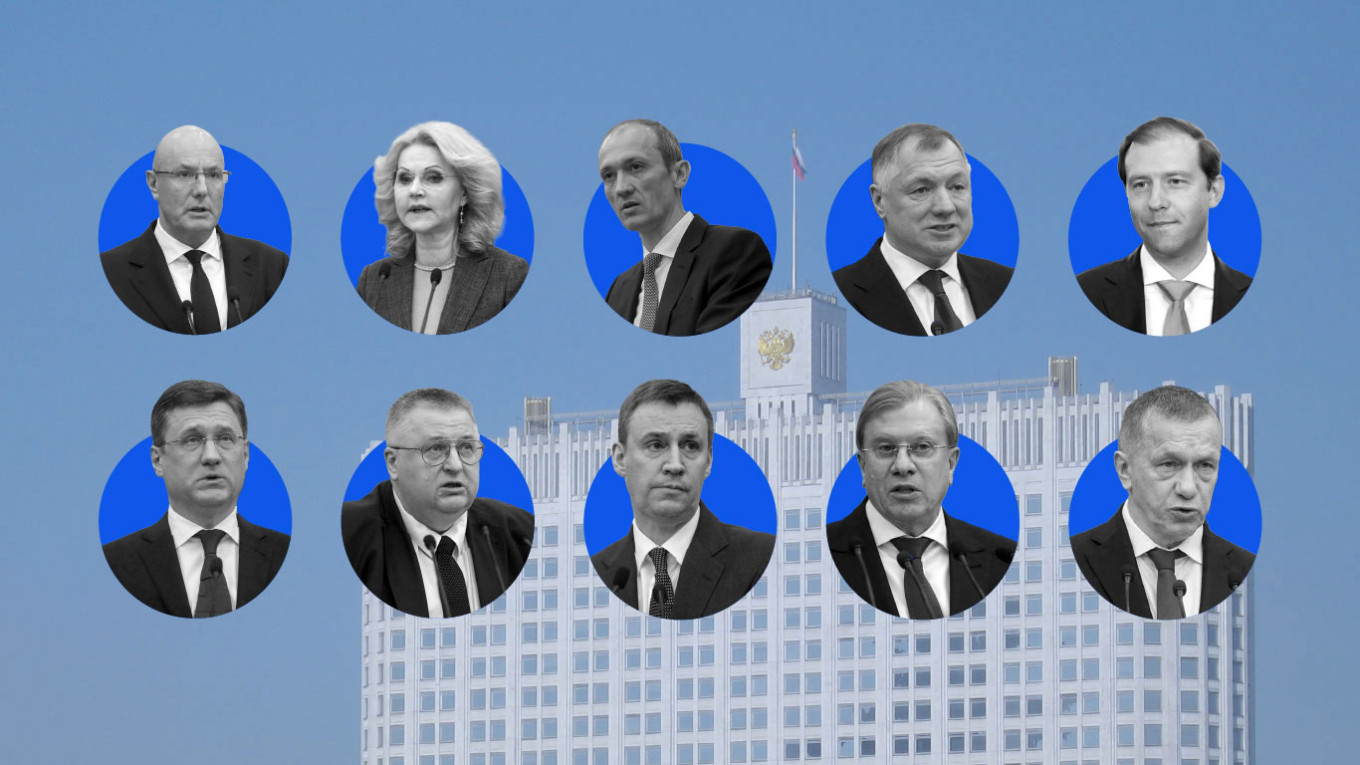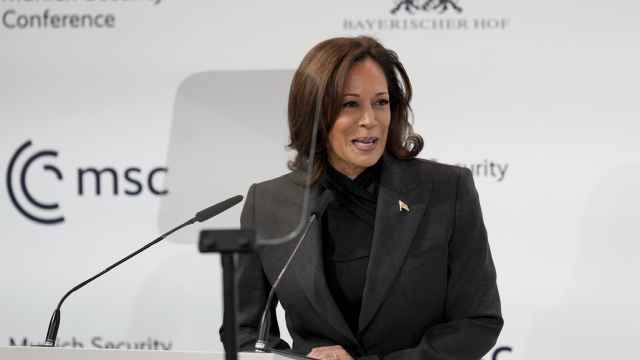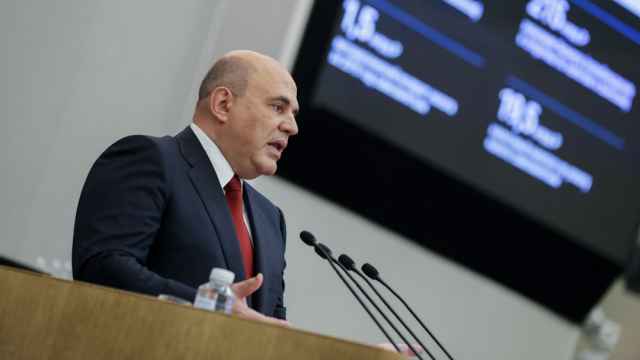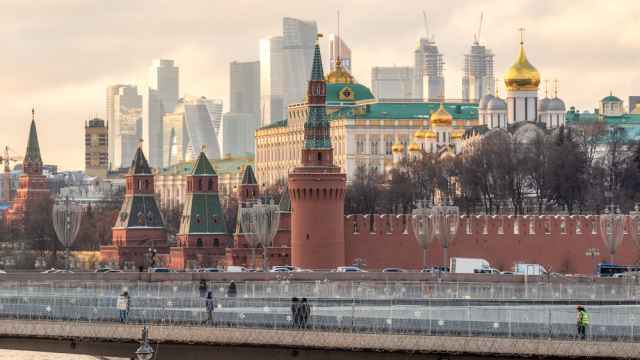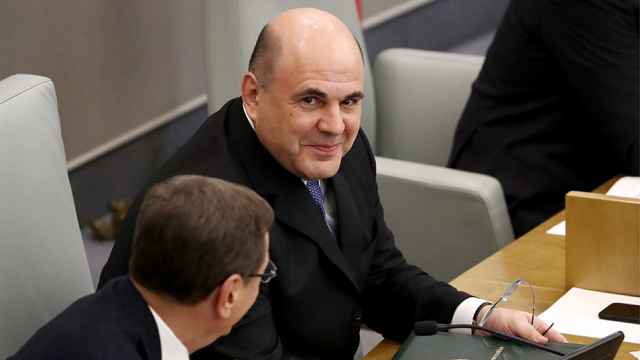Following the inauguration of President Vladimir Putin to a fifth term in office on May 7, the Russian government has undergone a reshuffle of ministers in cabinet positions.
Prime Minister Mikhail Mishustin, who was reappointed to a second term, submitted his cabinet nominations to the Russian parliament late last week, and in the days since, they have been swiftly approved by lawmakers.
There was speculation ahead of the reshuffle about who would stay and who would go, but besides the shocking ouster of Sergei Shoigu as defense minister, much in the government has remained the same.
Here’s a guide to the people who make up Mishustin’s cabinet, with the latest new faces and who’s changed places.
First Deputy Prime Minister:

Now serving as first deputy prime minister, Manturov was elevated from the twin posts of deputy prime minister and industry and trade minister after Putin tapped his predecessor Andrei Belousov as Russia’s new defense minister.
A government statement highlighted Manturov’s role in “ensuring technological leadership as stated in the new May decree signed by the president,” singling out the defense sector alongside other key industries like aircraft manufacturing and machine-tool building.
The new first deputy prime minister has seen his star rise since Moscow launched the full-scale invasion, overseeing increasingly important issues of industrial policy as Russia seeks to produce more tanks, guns, missiles, and ammo to wage war on Ukraine.
Deputy Prime Ministers:

Golikova, who grew to prominence when she oversaw Russia’s Covid-19 response center, will continue to focus on social policy in Mishustin’s second cabinet.
Her role is defined as “strengthening interethnic and inter-religious harmony in the country through the preservation of traditional Russian spiritual, moral and cultural values.”

Patrushev, a newcomer who previously served as Russia’s agriculture minister, will replace Viktoria Abramchenko in overseeing policy on agriculture and the environment.
As the son of former Russian Security Council chairman Nikolai Patrushev, the younger Patrushev has been rumored to be on the shortlist of Putin’s possible successors.
Ambramchenko, meanwhile, will “transition to a new place of work.” But where exactly is still a mystery.

Chernyshenko will oversee sport, tourism, and education to advance what the government calls its “renewed national goal of bringing up a harmoniously developed personality... starting from kindergarten and ending with university.”
Before joining the government, Chernyshenko was the general director and chairman of the board at Gazprom Media, as well as the president of the Continental Hockey League, which comprises mostly Russian clubs.

Savelyev, who previously served as transportation minister, is another newcomer who will oversee issues related to transportation after having “ensured the resilience of the entrusted industry in the face of Western sanctions” at his last job.
He honed his skills in the transportation sector after being plucked from the corporate world to lead the flagship air carrier Aeroflot’s transformation into a modern company. Savelyev held that position between 2009 and 2020.

Novak will continue to oversee Russia’s energy industry but will now also take on economic policy from the outgoing Belousov.
As energy minister between 2012 and 2020, Novak ensured Russia’s seat at the table with the oil-producing organization OPEC as part of an informal wider group known as OPEC+. Novak continued to forge that alliance after Putin promoted him to deputy prime minister in 2020.

Grigorenko, who also serves as chief of the government staff, will continue to oversee the financial and digital development industries.
His additional new duties include communication and antitrust policy, with the government saying he will “take charge of the digital transformation of public administration, key sectors of the economy, and the social sector.”
Grigorenko is a Federal Tax Service veteran who has headed the Russian government apparatus — whose main task is to organize the government bureaucracy’s activities and monitor its work — since Mishustin’s first cabinet in 2020.

Khusnullin will return to Mishustin’s cabinet to oversee construction. On Monday, he vowed “continued cooperation with the Defense Ministry on housing, building fortifications, and the necessary infrastructure” in the Russian-occupied territories of Ukraine.
As deputy Moscow mayor for urban construction between 2010 and 2020, he oversaw some of the Russian capital’s largest-ever expansion, including new metro station openings and stadium overhauls ahead of the 2018 FIFA World Cup.
In the previous government cabinet, Khusnullin was tasked with overseeing repairs of the Crimea bridge, which was damaged in a bombing attack in October 2022. A few months later, the deputy prime minister drove across the bridge alongside Putin.

Overchuk, who left the Federal Tax Service in 2020 to join his boss Mishustin in government, will continue to oversee international cooperation, including relations with countries that are members of the Commonwealth of Independent States and the Eurasian Economic Union.

Trutnev will continue to oversee Russia’s Far East. He started his career in the Perm region, where he first served as the mayor of the regional capital between 1996 and 2000, and then as governor between 2000 and 2004.
He was appointed as natural resources minister in 2004, and then later, as presidential assistant and presidential envoy to the Far East, a post which he still holds.
As part of the 2020 constitutional changes that allowed Putin to seek his fifth and sixth terms, Andrei Belousov’s and Sergei Lavrov’s candidacies for the respective posts of defense minister and foreign minister will be considered on Wednesday by the upper-house Federation Council, which like the Duma has voted in lock-step to advance the Russian president’s agenda.
At the same time, the Federation Council has already approved reappointments for the heads of the government’s so-called “security block,” including Foreign Intelligence Service (SVR) chief Sergei Naryshkin and Interior Minister Vladimir Kolokoltsev, among others.
Besides that, the appointments of 16 “civilian” government ministers have also received a green light from lawmakers. Among those, 11 ministers were reappointed, while the other five were newcomers.
New Ministers:

Tsivilyov, the reported husband of Putin’s niece Anna Tsivilyova, replaced Nikolai Shulginov as energy minister.
As the former governor of the coal-mining Kemerovo region, Tsivilyov brandished his pro-industry credentials to the State Duma’s approval committee on Sunday, including his 11 years of experience navigating ships in the Mediterranean Sea, as well as the Arctic and Atlantic oceans.
In 2018, Tsivilyov, then serving as deputy governor of the Kemerovo region, became known across Russia after he got down on his knees to apologize to residents for a major shopping mall fire that killed dozens of people, including children. His former boss at the time, Aman Tuleyev, resigned amid a public outcry over the tragedy.

Alikhanov served two terms as governor of the Kaliningrad exclave before replacing Denis Manturov as industry and trade minister. However, he did work briefly at the ministry in 2013, dealing with issues of state regulation and foreign trade.
He is among a rising group of young technocrats appointed to federal posts as part of Kremlin Deputy Chief of Staff Sergei Kiriyenko’s public administration training and promotion system.

Starovoit replaced Vitaly Savelyev as transportation minister after serving for nearly five years as the governor of the western Kursk region, which has been regularly attacked by Ukrainian drones and armed incursions since the start of the war.
Before his stint as governor, Starovoit was the head of Russia’s Federal Road Agency, and then later, served as deputy transportation minister.

Degtyarev, whom Putin appointed as governor of the Far East Khabarovsk region after his popular predecessor Sergei Furgal was arrested and then later jailed on murder charges, replaced Oleg Matitsyn as sports minister.
“Well, of course, this came as a surprise since, as the president’s soldier, I promised Vladimir Vladimirovich that I would develop the Khabarovsk region,” he told journalists when asked about his new ministerial position.
A former fencing champion, Degtyarev has been positioned as the man who will “confront the challenges” of wartime bans against Russian athletes from international athletic competitions.

Lut will take over for her former boss Dmitry Patrushev as agriculture minister. She worked in the banking industry for nearly two decades before going into government in 2018.
Her most recent private sector job was at the Russian Agricultural Bank, which provides lending support to Russian agribusiness.
A Message from The Moscow Times:
Dear readers,
We are facing unprecedented challenges. Russia's Prosecutor General's Office has designated The Moscow Times as an "undesirable" organization, criminalizing our work and putting our staff at risk of prosecution. This follows our earlier unjust labeling as a "foreign agent."
These actions are direct attempts to silence independent journalism in Russia. The authorities claim our work "discredits the decisions of the Russian leadership." We see things differently: we strive to provide accurate, unbiased reporting on Russia.
We, the journalists of The Moscow Times, refuse to be silenced. But to continue our work, we need your help.
Your support, no matter how small, makes a world of difference. If you can, please support us monthly starting from just $2. It's quick to set up, and every contribution makes a significant impact.
By supporting The Moscow Times, you're defending open, independent journalism in the face of repression. Thank you for standing with us.
Remind me later.


